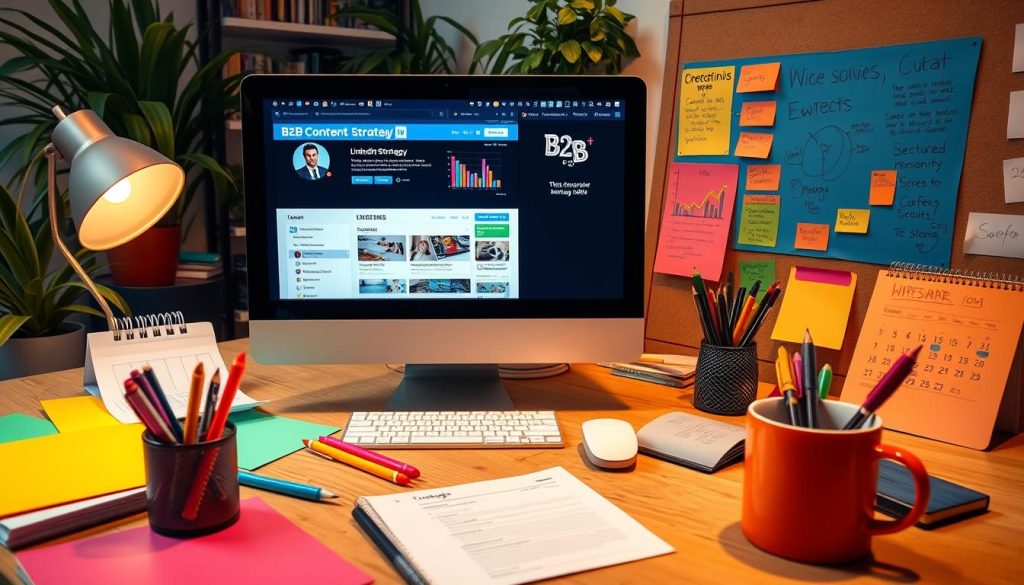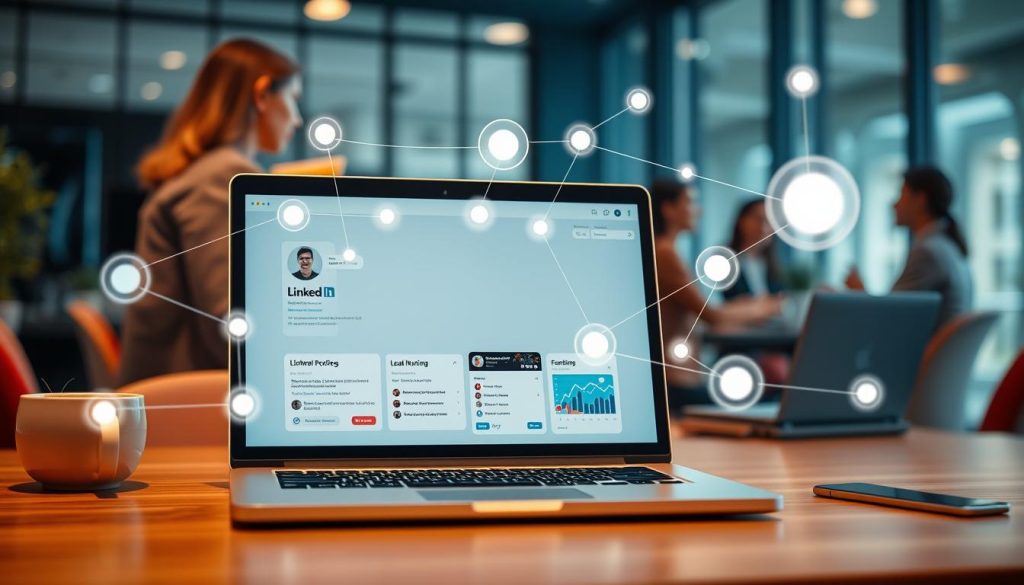LinkedIn is a powerful tool for B2B businesses to find quality leads. As we get closer to 2025, knowing how to use LinkedIn will be key. This article will show you how to make the most of LinkedIn for B2B lead generation.
Key Takeaways
- Understand the growing significance of LinkedIn in B2B marketing and lead generation.
- Discover strategies for creating a powerful and professional LinkedIn profile that attracts your target audience.
- Learn how to build a targeted connection strategy and personalize your outreach to potential leads.
- Explore effective methods for creating engaging content that drives meaningful interactions on LinkedIn.
- Leverage LinkedIn’s features, such as advertising and networking groups, to amplify your lead generation efforts.
Understanding the Importance of LinkedIn in B2B Lead Generation
In the fast-changing world of B2B marketing, LinkedIn has become a key platform for sales and lead generation. As marketing trends evolve, more professionals see LinkedIn’s value in reaching decision-makers. It helps drive targeted lead generation efforts.
Current Trends in B2B Marketing
The B2B marketing world is changing fast. There’s a focus on personalization, using many channels, and new technologies. Companies use LinkedIn for enterprise sales to connect with the right customers better.
Why Choose LinkedIn for Lead Generation
- It has a huge professional network of over 800 million users, many are key decision-makers.
- It offers targeted and customizable ads to reach the perfect audience.
- It’s great for showing off your expertise and building your brand through content and B2B marketing trends.
- It helps build relationships and find buying signals with detailed profile data and analytics.
Key Statistics to Know for 2025
As the B2B world keeps changing, knowing the latest trends and stats is key. Reports say LinkedIn for enterprise sales will be even more important for lead generation by 2025. There will be more users, engagement, and effective ads.
“LinkedIn has become an indispensable tool for B2B marketers, offering unparalleled access to a highly engaged professional audience and the ability to craft hyper-personalized campaigns that drive real results.”
As LinkedIn’s role in B2B marketing grows, businesses must adapt to stay ahead. They need to use LinkedIn’s unique benefits to their advantage.
Crafting the Perfect LinkedIn Profile
Your LinkedIn profile is a key tool in B2B lead generation. It shows your professional brand and draws in potential prospects. To make a strong LinkedIn profile, focus on important elements that boost visibility and show your unique value.
Essential Elements of a Professional Profile
A good LinkedIn profile has a few key parts:
- A professional, high-quality profile picture that fits your brand
- A compelling headline that sums up your expertise and value
- A detailed “About” section that showcases your experience, skills, and achievements
- A complete list of your work history, education, and any relevant certifications or awards
- Endorsements and recommendations from your connections, proving your expertise
Using Keywords for Maximum Visibility
To show up in searches, use LinkedIn profile optimization keywords in your profile. Include these keywords in your headline, summary, and job descriptions. This helps potential leads find your expertise and what you offer.
The Role of a Compelling Headline
Your LinkedIn headline is your first chance to impress leads. A strong, professional branding headline can greatly increase your visibility and engagement. Use it to highlight your expertise, industry focus, and the benefits you offer to your target audience.
“A well-crafted LinkedIn profile can be the difference between a missed opportunity and a valuable connection.”
Building a Targeted Connection Strategy
In the fast-paced world of B2B lead generation, a strategic LinkedIn approach is key. Knowing your ideal client and using the right tools helps you find and connect with promising prospects. This sets the stage for outreach that really speaks to decision-makers.
Identifying Your Ideal Client Profile
Understanding your target audience is the first step in a good LinkedIn strategy. Define your ideal client by looking at industry, company size, job title, and pain points. This detailed profile will guide your search and shape your outreach messages.
Tools for Finding Prospective Connections
- LinkedIn’s advanced search: Use the platform’s search to find potential connections that match your ideal client profile.
- Industry-specific groups: Join groups related to your target market to meet professionals and find new prospects.
- Third-party prospecting tools: Check out tools and platforms that help find and filter quality connections.
Importance of Personalization in Outreach
Personalization is crucial in LinkedIn networking to stand out and build real connections. Write personalized messages that show you understand the prospect’s challenges and how you can help. This approach boosts response rates and builds lasting relationships.
| Personalization Element | Example |
|---|---|
| Referencing common connections | I noticed we’re both connected to Jane Doe, who spoke highly of your work at XYZ Corporation. |
| Mentioning relevant experience or expertise | As a fellow marketing professional with extensive experience in the SaaS industry, I believe I can offer valuable insights to support your lead generation efforts. |
| Highlighting shared interests or goals | I’ve been following your company’s growth and admire the innovative approach you’ve taken to streamlining procurement processes. I’d welcome the opportunity to discuss how our solution could complement your initiatives. |
By focusing on a targeted strategy, using the right tools, and personalizing your outreach, you can maximize LinkedIn for B2B lead generation. This approach helps you connect with your ideal clients, leading to lasting and beneficial relationships.
Creating Engaging Content for LinkedIn
In today’s competitive B2B world, a strong LinkedIn content strategy is key. It helps your brand stand out and attract quality leads. By knowing what content your audience likes and how to post effectively, you can boost your lead generation. This will also increase engagement on LinkedIn.
Types of Content That Drive Engagement
Not all content on LinkedIn is the same. To grab your connections’ attention and be seen as a B2B thought leader, mix up your content. Focus on these types:
- Insightful industry analysis and trend reports
- Educational how-to guides and tutorials
- Thought-provoking opinion pieces and expert interviews
- Visually engaging infographics and data visualizations
- Behind-the-scenes looks at your company culture and team
Best Practices for LinkedIn Posts
To make your LinkedIn content strategy work, follow some key posting tips. Here are a few:
- Craft attention-grabbing headlines that intrigue your audience
- Leverage relevant keywords to improve your visibility in search
- Engage your connections by posing thought-provoking questions
- Encourage comments and discussions to build rapport with your network
- Experiment with posting times and frequencies to find your optimal cadence
Using Rich Media to Capture Attention
In the fast-paced world of social media, visuals are key. Use images, videos, and slides to make your posts stand out. Make sure these media assets work well on LinkedIn for the best display.

“Effective LinkedIn content strategy is not about self-promotion; it’s about providing genuine value to your connections and establishing your brand as a trusted industry authority.”
Leveraging LinkedIn Groups for Networking
LinkedIn Groups are a key tool for B2B networking and building relationships. They offer a chance to connect with your target audience through rich discussions and shared interests. This can open up many opportunities for businesses.
Benefits of Joining Relevant Groups
- Access to a highly targeted pool of potential customers and industry peers
- Opportunities to showcase your expertise and build thought leadership
- Ability to stay up-to-date on industry trends and latest developments
- Potential for valuable collaborations and strategic partnerships
Strategies for Active Participation
To get the most out of LinkedIn Groups, you need to be active and consistent. Here are some strategies:
- Regularly share relevant, informative content that adds value to group members.
- Join discussions by asking thoughtful questions and sharing insightful responses.
- Connect with others and build real relationships.
- Work together on projects or initiatives that match the group’s interests.
How to Promote Your Business Without Being Salesy
When promoting your business in LinkedIn Groups, find a balance. Avoid direct sales pitches, as they can repel potential customers. Instead, be a reliable, trustworthy resource by:
- Sharing content that solves the group’s problems and challenges.
- Offering advice and insights without pushing for a sale.
- Showing your expertise and experience through thoughtful contributions.
- Engaging in real conversations and building relationships naturally.
By using LinkedIn Groups, businesses can connect with a large network of B2B contacts. They can also establish themselves as trusted leaders in their industry. This can lead to high-quality leads and meaningful sales opportunities.
Converting Connections to Leads
LinkedIn is a key platform for B2B marketing, helping to find qualified leads. But, turning these connections into real business chances is the real challenge. By using smart follow-up methods, building relationships with care, and spotting when prospects are ready to buy, you can move through the B2B sales funnel. This unlocks the full power of your LinkedIn outreach.
Steps for Follow-Up After Connection
- Write a personalized message that shows you care and want to learn more about their business.
- Share valuable insights or resources that solve their problems, showing your expertise and help.
- Propose a time to talk more, either online or by phone, to explore working together.
Nurturing Relationships Through Messaging
Good LinkedIn lead nurturing is more than just a single follow-up. Keep in touch by sharing relevant content, commenting on their posts, and starting real conversations. This builds trust and makes your brand memorable, showing you’re a valuable resource to them.
Identifying Buying Signals from Prospects
As you talk to your LinkedIn connections, listen for signs they’re ready to move forward in the B2B sales funnel. Watch for how engaged they are, the questions they ask, and any problems they mention. These clues help you adjust your approach and time your outreach perfectly. This way, you can turn your connections into strong LinkedIn lead nurturing chances.

“Successful LinkedIn outreach is not just about making connections; it’s about nurturing those relationships and identifying the right moment to turn them into tangible business opportunities.”
Utilizing LinkedIn Ads to Enhance Reach
For B2B marketers, LinkedIn Ads can be a big help. It boosts your lead generation. LinkedIn’s ads are designed to target and engage your ideal customers.
Overview of LinkedIn Advertising Options
LinkedIn has many ad formats to meet your marketing goals. You can choose from sponsored content, InMail, dynamic ads, and text ads. Each type offers a chance to grab your B2B audience’s attention and increase engagement.
Targeting Your Ads for Maximum Impact
LinkedIn Ads are great because they let you target precisely. You can use job titles, company size, and industry to find the right people. This way, you can reach the most important decision-makers in your market.
Budgeting for LinkedIn Ad Campaigns
Setting a good budget is key for LinkedIn Ads success. Think about your goals, audience, and ROI to figure out your budget. Try different bids and campaign setups to get the most from your ad spend.
| LinkedIn Ads Format | Key Benefits | Recommended Use Case |
|---|---|---|
| Sponsored Content | Highly engaging, native-looking ads that blend seamlessly into the LinkedIn feed | Raising brand awareness, driving website traffic, and generating high-quality leads |
| Sponsored InMail | Personalized, attention-grabbing messages delivered directly to your target audience’s LinkedIn inbox | Nurturing relationships, promoting exclusive offers, and facilitating one-on-one conversations |
| Dynamic Ads | Customizable, AI-powered ads that automatically adjust to individual user preferences | Retargeting website visitors, showcasing product or service offerings, and driving account-based marketing initiatives |
By using LinkedIn Ads, B2B marketers can grow their reach and engage their audience. This leads to more high-ticket leads, helping your business grow.
Measuring Success in LinkedIn Outreach
It’s key to track your LinkedIn outreach performance. This helps you see what’s working and what’s not. By watching key metrics, using the right tools, and making smart changes, you can boost your B2B lead generation on LinkedIn.
Key Metrics to Track
Focus on metrics like connection requests, acceptance rates, post engagement, lead generation, and conversion rates. These LinkedIn analytics give you insights into your outreach success.
Tools for Analyzing Lead Generation Efforts
Use LinkedIn’s analytics and third-party tools for a full view of your B2B lead generation metrics. LinkedIn shows profile views, impressions, and engagement. Tools like Dux-Soup, Sales Navigator, and Hootsuite offer deeper insights into your outreach.
Adjusting Strategies Based on Data Insights
Check your LinkedIn analytics and B2B lead generation metrics often. This helps you spot trends and areas to improve. You can then tweak your content, messaging, and outreach to better connect with your audience and attract more leads.
| Metric | Benchmark | Your Performance |
|---|---|---|
| Connection Requests Sent | 50-100 per week | 75 per week |
| Connection Acceptance Rate | 30-50% | 45% |
| Post Engagement Rate | 2-5% | 3.5% |
| Lead Generation Rate | 10-20% | 15% |
| Conversion Rate | 5-10% | 8% |
By keeping an eye on these LinkedIn analytics and B2B lead generation metrics, you can make smart choices. This will help you improve your LinkedIn outreach and achieve better results for your business.
Future Trends in LinkedIn Outreach for B2B
Looking ahead to 2025, B2B marketing is set for big changes. LinkedIn, a top professional network, will remain key for lead generation. But, new strategies and tech will shape how we do it.
Predictions for B2B Marketing in 2025
In the next few years, B2B marketing will focus more on personalization and data. Artificial intelligence (AI) and machine learning (ML) will also play big roles. These tools will help find the right people and send messages that really speak to them.
The Role of Technology in LinkedIn Lead Generation
AI and ML will change LinkedIn marketing a lot. They’ll help score leads, suggest content, and predict trends. Virtual and augmented reality might even bring new, immersive experiences to LinkedIn.
Preparing for the Evolving Landscape of LinkedIn Marketing
To stay ahead, B2B marketers need to keep learning and using new tech. They should always test and improve their methods. By keeping up with trends and using data, businesses can thrive in LinkedIn’s competitive world.
FAQ
How can I optimize my LinkedIn profile to attract the right decision-makers?
To draw in the right people, make your LinkedIn profile stand out. Use a catchy headline and a detailed summary. Also, include keywords to help people find you.
Showcase your skills, achievements, and what you offer. This will grab the attention of those you want to reach.
What are the best strategies for building a targeted network on LinkedIn?
Start by knowing who you want to connect with. Use LinkedIn’s tools to find and connect with the right people. Personalize your messages to get better responses.
How can I create engaging content on LinkedIn to establish thought leadership?
Create a plan for sharing valuable content. Try different types like articles, videos, and LinkedIn Live. This will keep your audience interested.
Always share insights and solutions. This will make you seen as an expert in your field.
How can I leverage LinkedIn Groups to expand my network and generate leads?
Join groups that match your industry or target audience. Be active and share your knowledge. Focus on adding value, not just promoting yourself.
What are the best practices for converting LinkedIn connections into qualified leads?
After connecting, send personalized messages to build relationships. Look for signs that people are interested in what you offer. Provide value and show your expertise to move them forward.
How can I utilize LinkedIn Ads to enhance my lead generation efforts?
Use LinkedIn Ads to target your audience more effectively. Choose the right ad types and tailor your messages. This will help you get high-quality leads.
What key metrics should I track to measure the success of my LinkedIn outreach?
Keep an eye on metrics like connection requests and engagement. Use LinkedIn’s analytics and other tools to understand your performance. This will help you improve your strategies.
How can I prepare for the evolving landscape of LinkedIn marketing in 2025?
Stay up-to-date with the latest in B2B marketing trends. This includes new technologies like AI and automation. Adjust your strategies to meet the changing needs of your audience.


